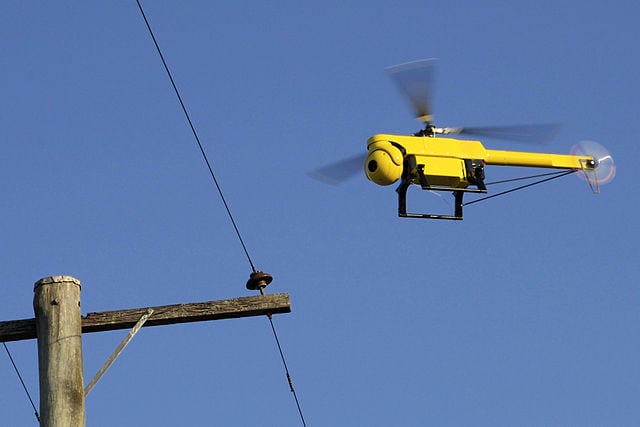 |
| A UAS used to inspect power lines. |
[Avionics Today 12-10-14] The FAA granted five new regulatory exemptions for Unmanned Aircraft Systems (UAS) operations to four companies representing several industries that promise to benefit from UAS technology: Trimble Navigation Limited, VDOS Global, Clayco and Woolpert. These companies want to fly UAS to perform operations for aerial surveying, construction site monitoring and oil rig flare stack inspections.
The announcement follows the FAA’s exemption granted to seven film and video production companies earlier this year. Transportation Secretary Anthony Foxx found that the exempt UAS do not need an FAA-issued certificate of airworthiness in the proposed operations because they do not pose a threat to national airspace users or national security. These findings are permitted under Section 333 of the FAA Modernization and Reform Act of 2012.
“Unmanned aircraft offer a tremendous opportunity to spur innovation and economic activity by enabling many businesses to develop better products and services for their customers and the American public,” said Foxx. “We want to foster commercial uses of this exciting technology while taking a responsible approach to the safety of America’s airspace.”
President and CEO of the Association for Unmanned Vehicle Systems International (AUVSI) Michael Toscano commended the action, saying, “We are excited to see the FAA grant these exemptions for commercial use of UAS and to begin to unlock the various benefits of this technology. Allowing UAS operations for aerial surveying, construction site monitoring and oil rig flare stack inspections will help companies to do their work more safely and efficiently.
“While this is a positive step, granting exemptions on a case by case basis is not an effective way to regulate the use of UAS in the long term. The FAA needs to begin the rulemaking process and finalize a rule for the use of UAS as quickly as possible to allow UAS technology to realize its full potential and allow a wide range of industries to reap its benefits.”